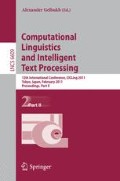Abstract
Bootstrapping has been used as a very efficient method to extract a group of items similar to a given set of seeds. However, the bootstrapping method intrinsically has several parameters whose optimal values differ from task to task, and from target to target. In this paper, first, we will demonstrate that this is really the case and serious problem. Then, we propose self-adjusting bootstrapping, where the original seed is segmented into the real seed and validation data. We initially bootstrap starting with the real seed, trying alternative parameter settings, and use the validation data to identify the optimal settings. This is done repeatedly with alternative segmentations in typical cross-validation fashion. Then the final bootstrapping is performed using the best parameter setting and the entire original seed set in order to create the final output. We conducted experiments to collect sets of company names in different categories. Self-adjusting bootstrapping substantially outperformed a baseline using a uniform parameter setting.
Access this chapter
Tax calculation will be finalised at checkout
Purchases are for personal use only
Preview
Unable to display preview. Download preview PDF.
References
Agichtein, E., Gravano, L.: Snowball: Extracting Relations from Large Plain-Text Collections. In: Proc. 5th ACM International Conference on Digital Libraries (ACM DL) (2000)
Brin, S.: Extracting Patterns and Relations from the World Wide Web. In: Proc. Conference of Extending Database Technology, Workshop on the Web and Databases (1998)
Collins, M., Singer, Y.: Unsupervised Models for Named Entity Classification. In: Proc. of the Joint SIGDAT Conference on Empirical Methods in Natural Language Processing and Very Large Corpora (1999)
Goldberg, A.B., Zhu, X.: Keepin’ it real: Semi-supervised learning with realistic tuning. In: NAACL 2009, Workshop on Semi-supervised Learning for NLP (2009)
Manning, C.D., Schutze, H.: Foundations of Statistical Natural Language Processing. The MIT Press, Cambridge (1999)
Pantel, P.: Of search and Semantics. In: NSF Symposium on Semantic Knowledge Discovery, Organization and Use (2008)
Ravichandran, D., Hovy, E.: Learning surface text patterns for a question answering system. In: Proceedings of ACL 2002, Philadelphia, PA, pp. 41–47 (2002)
Sun, A.: A Two-Stage Bootstrapping Algorithm for Relation Extraction. In: Proceedings of Recent Advances in Natural Language Processing 2009, Borovets, Bulgaria (2009)
Strzalkowski, T., Wang, J.: A Self-Learning Universal Concept Spotter. In: COLING 1996 (1996)
Yangarber, R., Grishman, R., Tapanainen, P., Huttunen, S.: Automatic Acquisition of Domain Knowledge for Information Extraction. In: COLING 2000 (2000)
Paşca, M.: Organizing and Searching the World Wide Web of Fact — Step Two: Harnessing the Wisdom of the Crowds. In: Proceedings of the 16th International World Wide Web Conference (WWW 2007), pp. 101–110 (2007)
Pantel, P., Pennacchiotti, M.: Espresso: Leveraging Generic Patterns for Automatically Harvesting Semantic Relations. In: Proceedings of the 21st International Conference on Computational Linguistics and the 44th Annual Meeting of the Association for Computational Linguistics, pp. 113–120 (2006)
Sekine, S., Suzuki, H.: Acquiring Ontological Knowledge from Query Logs. In: Proceedings of the 16th International World Wide Web Conference (WWW 2007), pp. 101–110 (2007)
Author information
Authors and Affiliations
Editor information
Editors and Affiliations
Rights and permissions
Copyright information
© 2011 Springer-Verlag Berlin Heidelberg
About this paper
Cite this paper
Fujiwara, S., Sekine, S. (2011). Self-adjusting Bootstrapping. In: Gelbukh, A. (eds) Computational Linguistics and Intelligent Text Processing. CICLing 2011. Lecture Notes in Computer Science, vol 6609. Springer, Berlin, Heidelberg. https://doi.org/10.1007/978-3-642-19437-5_15
Download citation
DOI: https://doi.org/10.1007/978-3-642-19437-5_15
Publisher Name: Springer, Berlin, Heidelberg
Print ISBN: 978-3-642-19436-8
Online ISBN: 978-3-642-19437-5
eBook Packages: Computer ScienceComputer Science (R0)

